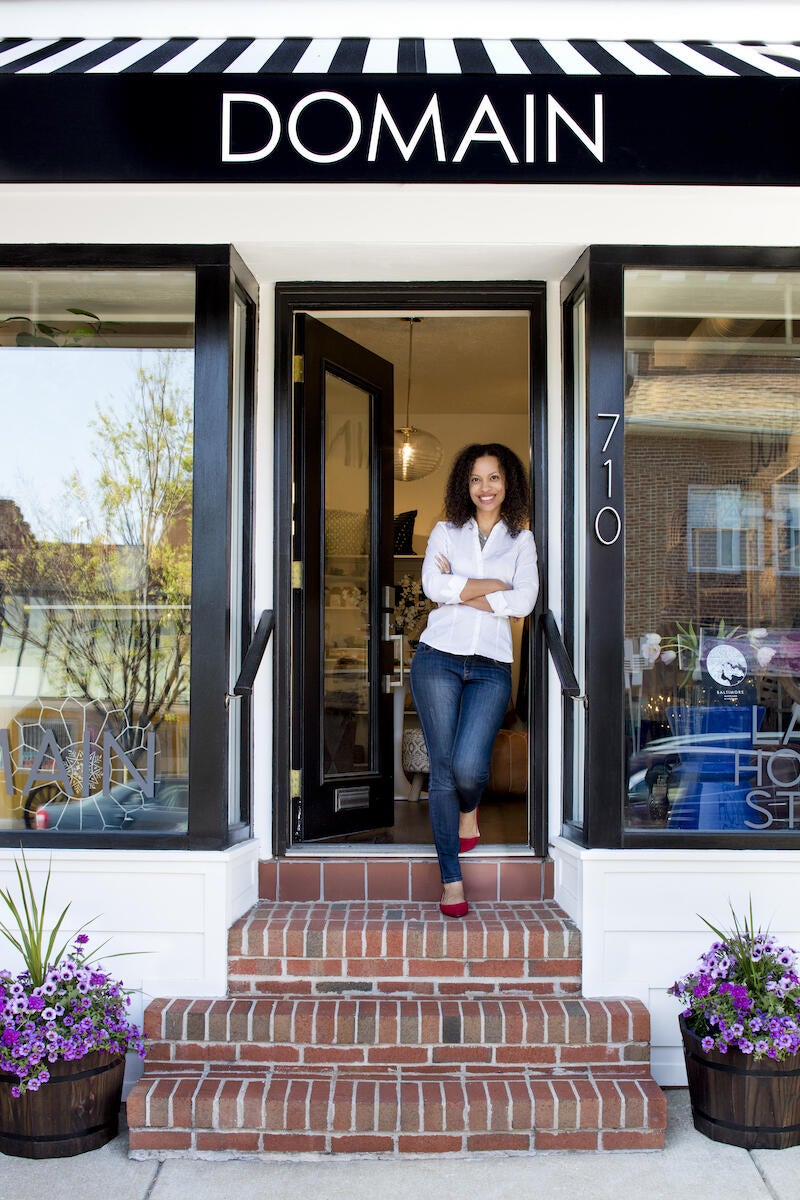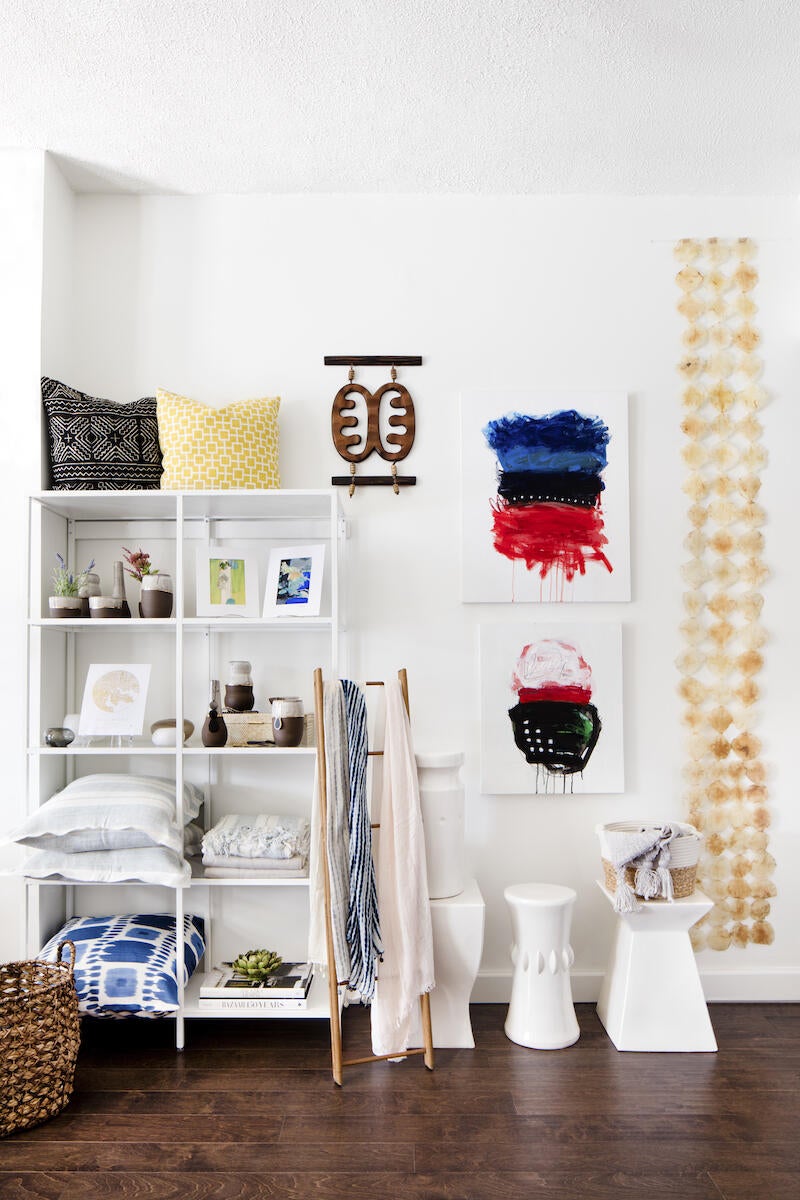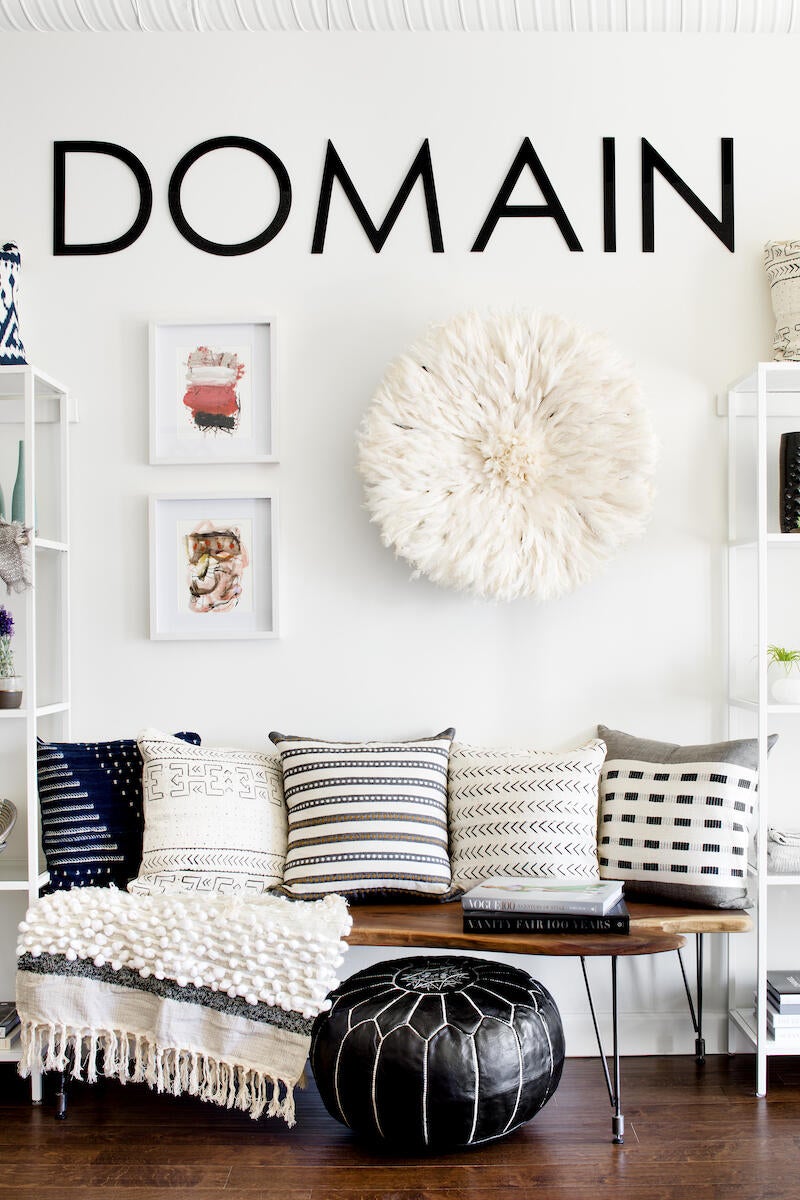In Business of Home’s series Shop Talk, we chat with owners of home furnishings stores across the country to hear about their hard-won lessons and challenges, big and small. This week, we spoke with Catonsville, Maryland–based designer Laura Hodges about her store, Domain by Laura Hodges Studio.

After getting her design degree and cutting her teeth under acclaimed designers in New York, Hodges moved to the Baltimore area to launch her eponymous interiors studio. She opened Domain in Catonsville in 2018, just in time for a flurry of national media attention celebrating her warm, tailored aesthetic. Here, she discusses how the store’s tiny footprint impacts business decisions, the advice from a fellow retailer that she rebuffed, and holding tight to her brand’s values.
Why did you want to go into retail when you did?
With all design projects, you need to make sure that the space feels personal and unique. Outside of furnishings, that comes through in accessories and smaller items, the finishing touches. I wanted a place where we could source those things for our own projects, and people who weren’t necessarily clients could also purchase things within our aesthetic. The other [motivating factor] was we wanted to be able to support our local community of artists and makers, and show the type of accessories we were drawn to, which is fair trade and sustainable items. Much of what we have in the shop is made here in our area, or at least in the state or the country. If anything is imported from overseas, it’s all resources that we know and trust.
How would you describe the aesthetic of the store, and does it differ from your design style?
I try to make sure that the shop is an extension of the aesthetic in our design projects, what you might see in our portfolio and Instagram. We had a project a couple of years ago, after the shop had opened, [where] we’d worked with our client through to artwork and accessories, and they’d never come into the shop. They came after the whole project was finished, and she said, “This makes sense! The shop looks exactly like what I would think based on knowing you.” She’s very happy with how everything went, but then was like, “I kind of wish that I had come in here first! I would’ve had even more insight to where we’d end up.” You can walk into one of our spaces by being in the shop.
Who is your typical customer, and how much is the trade versus foot traffic?
I was never planning to put the shop online. But in 2019, I was named a Next Wave designer by House Beautiful, and they said, “We’re giving a whole page of your feature to Domain.” I was like, “This is a national magazine, so we should probably put it online.” That was the impetus. We ship a lot to the West Coast, and do a fair amount [of business] through Facebook and Instagram.
We’ve had people come in who were interested in us as a design firm. They tend not to really buy anything, which is funny because they basically say, “We want you to tell us what to buy.” We even have clients come in and say, “Here’s my Christmas list. Can you please suggest what to buy as gifts?” They want our service in that way; they want us to guide them through that process.
I didn’t want to just have stuff. We wanted things that told a story. We finished a client’s project recently, and there was this big bookcase she asked us to style. We included some of her own things, but the rest of it was from Domain. Once it was done, I was able to walk through every single item: “This little picture was painted by this woman we know; this vase was made by this person; we designed this basket collection made by a female artisan collective out of Rwanda.” So we don’t just say: “Here’s a metal knot that came from I don’t know where.” Everything has meaning.

I was going to ask you to tell me about a favorite vendor of yours, or a favorite relationship with an artist.
It’s hard to pick just one. We work with a couple of local ceramists, like Hollow Work. We have designed baskets and trays with Kazi—their pieces are made overseas, but they are very dedicated to fair-trade practices, and they include a picture of the person who made it, which is really lovely. We research and vet our vendors quite thoroughly before we work with them, especially if we’re going to create a collection with them. There’s an artist named BB LaMartina, whose original pieces we carry, but we also commission pieces for our projects. We have a great relationship with her as well.
What is your general approach to sourcing, and has it changed over the years?
I went to New York Now, AmericasMart in Atlanta and High Point Market the first year, and they’re great markets. But our shop is quite small. We don’t have a massive overhead with a huge amount of inventory constantly turning over. It’s a bit of a luxury to make sure everybody we’re working with is as aboveboard as we want them to be. It’s a smaller pool of vendors, and we do tend to work with the same ones a lot, but we’re always open to new ones. We actually look on Etsy, which used to have a wholesale [section]. They no longer have that, but we can still access those vendors.
I’m always thinking about different opportunities to make unique pieces that are still sustainable and within this aesthetic. We try to keep it local; we try to know the vendors if we possibly can. For me, it’s also part of the sale—to be able to tell somebody, “Hey, you’re holding a vase—Iet’s go to [the artist’s] Instagram page to watch her make it.” It’s really cool to have that connection. We work with a local woodworker here, and they make a lot of tables and things for us. One day, I just saw this stack of wood offcuts, and I asked, “Could you make chopping boards for us?” Now they do.
Is there a certain object or category that you can barely keep in stock?
Vases. We have jewelry that does quite well, [as well as] the smaller items that are easy to use in lots of different places. Blankets are also easy to gift. We opened the shop thinking it was going to be people buying things for their own homes. It quickly became a gift destination, which we completely embraced once we realized.
Has your e-comm strategy or platform changed since that moment you mentioned with House Beautiful, as well as because of the pandemic?
Being online, we’ve definitely had the opportunity to create more of a connection with people. We can say, “It’s Mother’s Day coming up. Here are some wonderful ideas for your mother.” It’s not just about the product itself; we send out a newsletter and put out a blog talking about local businesses and experiences you can do with your mom. Instead of just, “Here’s a scarf,” we could say, “Why don’t you take your mom to this place for brunch and give her this scarf?” Or “Take your mom out for a spa day or help her create a spa day at home with these items.” It’s not just constant sales in your face—“Buy this product, buy this product”— it’s how you can improve your lifestyle and have a wonderful experience with these products.
What aspects of the pandemic hit your business the hardest?
One was our workshops. We would have them every Saturday, and having even five or six people together obviously could not happen. We stayed open online and were still shipping during the first part, then reopened in October [2020]. But we didn’t start workshops again until probably about a year ago, and even then, they were pretty slow for a long time.
Just getting people out to have experiences again has been a bit of a challenge because I think people got used to not doing that. People used to love the workshops; they would always sell out. We do one now that is actually pretty popular: weaving, making wall hangings and air plant holders. The workshops are run by local artisans and makers, and it’s about connecting with our community [to offer] different experiences. Of course, it’s lovely if they buy something, but if they just come in and then they tell somebody, now they know. It’s an extension of the marketing, to get people to come in.

Are there any challenges specific to operating in your area?
We have a fair bit of walking traffic, but I always feel we could do better. We’re one of those places that you might pop into on a casual Saturday stroll, just hang out for a little bit. But if you were driving past and couldn’t find a place to park, it might dissuade you from that walking experience.
There’s another little town [nearby] called Ellicott City, and their main [street] is really beautiful, with older buildings and antiques shops and lots of little cafes. People love to walk around there, and we’re hoping to build that up more where we are.
As someone who already had a thriving career in the design world, were there aspects of retail that surprised you?
When I was first considering the shop, I did a lot of research and spoke to people with retail shops. One retailer said to me, “You’re going to have to carry some ugly stuff because ugly stuff sells.” I remember thinking, “I hope I never get to that point.” I really don’t want to carry ugly things, because first and foremost, we’re a design firm. What we do has to be beautiful. We have values for our design projects, and our shop needs to maintain those brand values.
One reason we don’t carry things from some of the big gift shows is because one of our brand values is to differentiate ourselves by having locally made items, and that stuff is carried in a lot of places. [Our offerings are] not necessarily things you pick up at Bloomingdale’s, or that end up at HomeGoods. It’s much easier to buy in bulk—the more you buy, the better your pricing. It was surprising to realize that the thing with retail is turnover: to buy at as low a price as possible and sell at as high a price as possible. That just innately goes against our brand values, because if we’re going to try to support local artists and makers—yes, they need to be able to give us a good price, but I’m not trying to put them out of business by forcing them to sell at a lower price, or make 10 million of something so that they can get that cost down.
How do you feel about the future of small businesses like yours, in light of Amazon and some of the big boxes that are suffering?
It’s a challenge, because you see places like Amazon with “we have a small maker’s section now!” And they’ll be selling a lot of that same stuff. We use Faire, and you can click on different brand values when you’re searching—one is “things not sold on Amazon,” and I always click that one. It’s nothing against those brands; it’s more so that we can’t compete with Amazon. If they’re meeting that pricing, we can’t possibly compete. We can’t buy at the same volume.
We have to stay with makers who either have the same values, or that can’t make at that volume. I recently was talking to another smaller business that was talking to Target. Of this product that they were making, Target needed some insane amount, and the brand was like, “We don’t even know how to play in this field.” A lot of the big boxes have these loss leaders, products they don’t expect to ever make money on, just to get people in the door. We obviously don’t do things like that. So I think there’s always a place for smaller businesses that can have those values that the bigger boxes cannot. At some point, you can see through it.
Homepage image: Hodges moved to the Baltimore area to launch her eponymous interiors studio and opened Domain in Catonsville in 2018 | Courtesy of Laura Hodges Studio





























